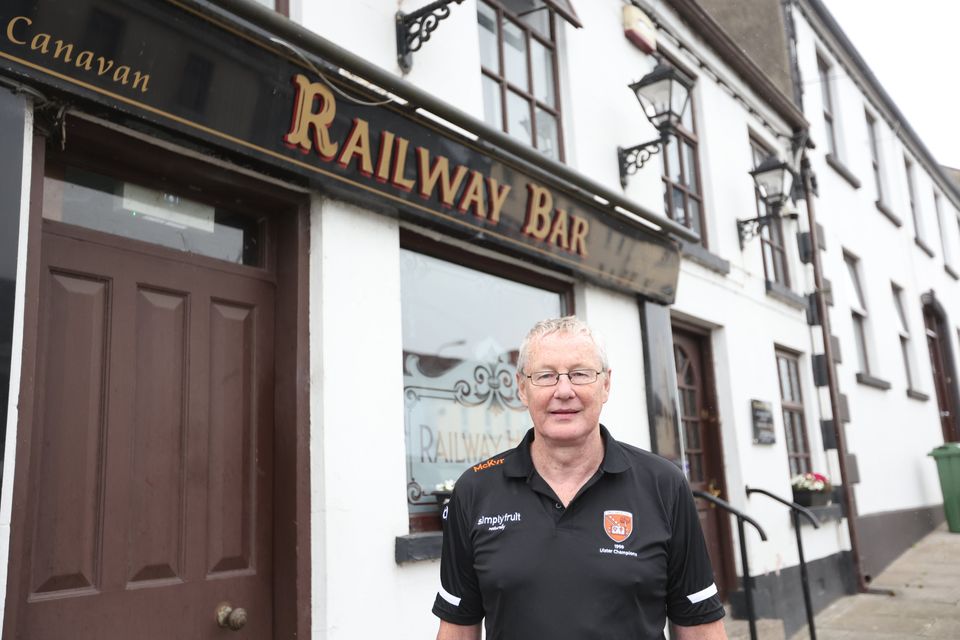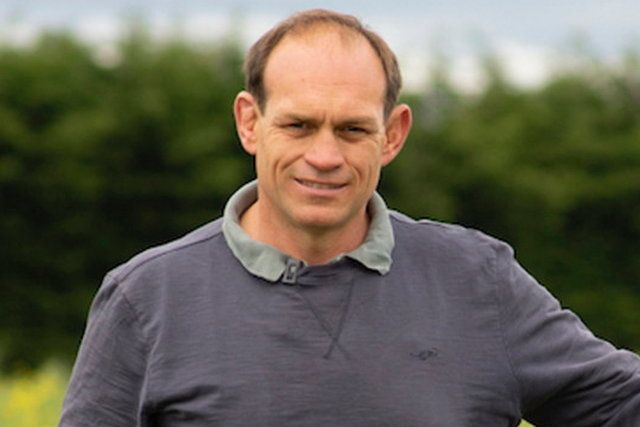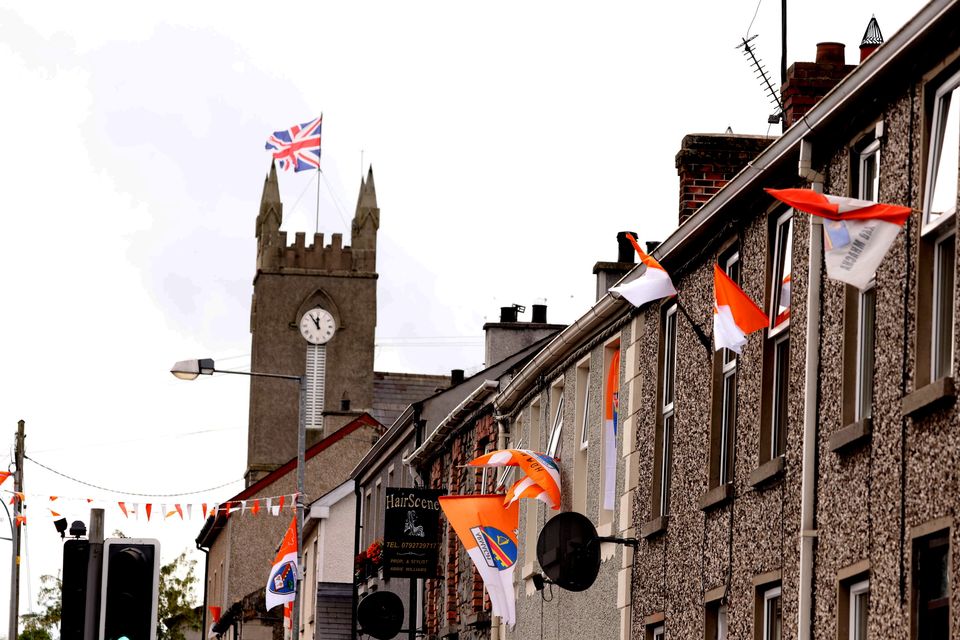Poyntzpass is a village full of ever-changing colour. At the moment, the overwhelming hue is orange, but there are still hints of red, white and blue all around, and it’s something that the residents are all passionate about.
The small area is technically part of the beginning of south Armagh, but it also borders Co Down, and only has a population of just over 600, which appears to be evenly split between people who identify as either unionist or nationalist.
Its inhabitants are proud of the villagers’ peaceful co-existence; many see Poyntzpass as a great example of cross-community harmony.
After the Twelfth celebrations finished, and Armagh’s inter-county GAA team then qualified for their first All-Ireland final in 21 years, the people of Poyntzpass were happy to come together to swap the communal decorations around.
The cross-community village of Poyntzpass embraces Armagh GAA flags with Twelfth bunting
Railway Bar owner Brian Canavan (Picture by Peter Morrison)
Robert O’Neill, chairman of the local GAA club, Redmond O’Hanlon’s, explained: “The red, white and blue bunting was still up around a week ago, and once we [Armagh] were in the final, I contacted the Poyntzpass Silver Band – they look after all the bunting – and I said we wanted to put bunting up, and asked if and when they would be removing theirs.”
The men set a date, and those from the band offered a lend of their cherry picker to help the football fans put their Armagh flags up.
“We have people from both communities playing for our club and involved in the committee and administration, and we started a cross-community youth club here last year. It’s all something we’re really proud of and we work really hard on that. If Armagh win, there’ll be a mad party all around for about a week or more.”
Armagh have only ever won one All-Ireland, back in 2002.
Poyntzpass native Simon Best – former rugby player for Ulster and Ireland, and brother of international rugby star Rory – was at that final.
He’ll be going to Croke Park for Sunday’s game too, despite many people across Northern Ireland thinking that could be a potentially odd thing for an Ulster Protestant to do.
“I was there in the previous two finals of my era – ‘02 and ‘03 – and it’ll be great to be able to get down again,” Simon said.
“All my kids play for the football club, so it’s great that they’ll get a chance to see it.”
Simon Best
Simon and his wife Katy have two sons and a daughter – Jack (14), Sam (13) and Lucy (10).
The ex-prop continued: “They’ve all been playing Gaelic since they were around six or seven – and they play rugby too.
“A number of kids in the village do both – Redmond O’Hanlon’s and Banbridge RFC. They’re a good group and they’re always stuck together.
“We’re very proud of that and the fact that a lot of shared education goes on between the two primary schools.
“Sport is very much a centrepiece, but lots of other things go on too.”
Reflecting on his own upbringing and career, Simon said: “There’s nothing more unifying than a single Ireland team.
“I grew up in a rugby family and we all supported Ireland. Without a doubt, sport is a massive unifier, and I was very lucky as well to have gotten the opportunity to play rugby at Croke Park.
“Very few have the opportunity to play there. Sport shows the way.”
One man who has also appeared at Croke Park is Brian Canavan – one half of the ‘Two Brians’ (alongside Lurgan’s Brian McAlinden) – who previously managed the Armagh GAA squad and led them to back-to-back Ulster titles in 1999 and 2000.
Brian Canavan also owns the Railway Bar in Poyntzpass, where one of the Troubles’ most sickening tragedies took place.
Despite the area being largely untouched by the conflict and paramilitaries, a noteable exception was when two best friends, Philip Allen and Damien Trainor – one a Protestant and the other a Catholic – were shot dead by the LVF.
It happened as they sat in the pub back in 1998, just weeks before the Good Friday Agreement was signed.
Armagh GAA flags and A union flag in Poyntzpass (Picture by Peter Morrison)
A majority of the duo’s family members and friends still live in the village, and while the incident is something the area would like to consciously forget, the men themselves are remembered fondly, their friendship a microcosm of Poyntzpass itself.
Speaking about the modern-day buzz around Armagh’s race for the Sam Maguire trophy in Dublin this weekend, Brian said: “Everybody’s talking about it, it’s a great topic of conversation and we’re very unique in this village in that it’s very mixed.
“There’s camaraderie and it’s one of the very few places where I think that can happen. People are very happy on both sides here and everybody wants to see Armagh win it.”
Brian himself played inter-county football up until 1990, and kicked two points when Armagh played Roscommon in the 1982 All-Ireland semi-final.
In 2021, Poyntzpass came together to hold a day of celebration in homage to the rugby career of their homegrown legend, Rory Best.
It was held at the GAA club’s grounds, and underage kids played a game of two halves – half rugby, half Gaelic football.
“I never thought I would see as many people on the Gaelic pitch from both sides of the community, celebrating Rory’s achievements,” noted Brian.
“I made a speech that day for Rory and we had great rapport. And I said Rory has something in common with me, because we both scored in Croke Park.
“First of all, a lot of Protestant people didn’t believe that I played in Croke Park! Catholic people didn’t realise that Rory had scored a try against Wales in Croke Park, and afterwards there was a crowd here and in all the pubs; it was a wonderful evening.”
And while Poyntzpass and its people are proud of their shared ambitions and relatively peaceful past, sometimes the greatest indication of integration is the fact that today’s young people don’t feel the need to reference it – or even know what it really is.
The under-15 girls at Redmond O’Hanlon’s Gaelic Athletic Club were getting ready to play a match against Madden when The Belfast Telegraph came to visit Poyntzpass.
Forward Kiera Knox is only 14 years old. When asked what she thought about the area’s cross-community relations she innocently replied: “Does that just mean people of all ages?”


